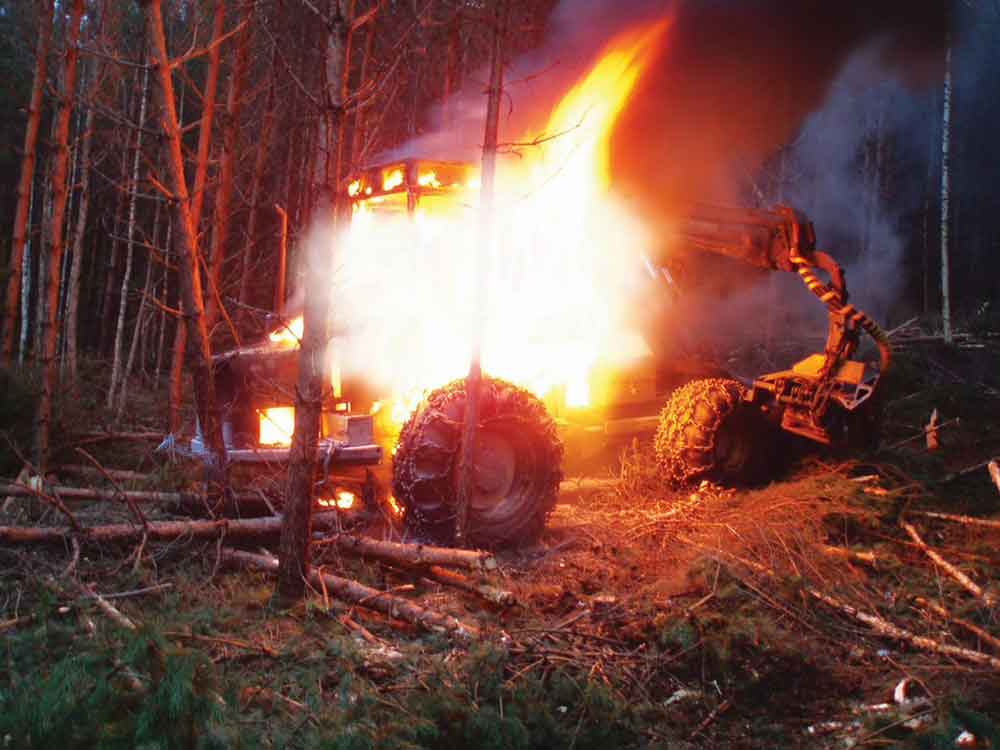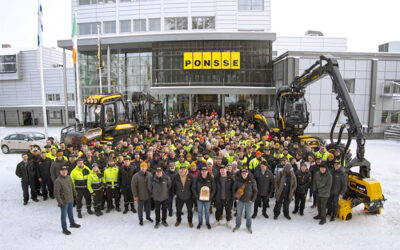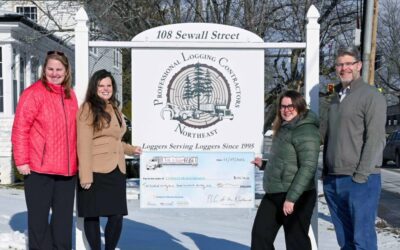A New Approach To Fire Suppression
The North American timber industry is more aware of the effects of wildfires than ever before. The intense fires around the continent this spring and summer have resulted in forced downtime and restricted activity. Though climate change has driven up the number of wildfires in Northern America, it is not the only cause.
Research shows that more than 80% of U.S. wildfires are caused by people; meaning that a huge amount of damage to the industry and the environment is preventable. Therefore, it’s important for individuals within the timber industry to understand the fire risks of their own activity and how they can prevent often disastrous consequences before they occur.
Chris Conway, technical director, Dafo U.S. discusses risks in the logging industry, the importance of proactive suppression and if there’s anything North America can learn from Sweden.
Machines used by the industry, run at high temperatures and carry large number of flammable oils and fuels. Highly flammable debris often accumulates around the vehicles, meaning the potential for outbreaks of fire is huge. This dangerous combination means that a single spark will easily cause a fire.

The sheer amount of fuel that is present in a forest—more and more of which is dry as temperatures increase—means that fires can take days or even weeks to get under control. As a result, a fire does not just affect the individual’s vehicle or area they’re working in but will likely cause wider industry downtime and affect the environment, damaging ecosystems.
These increased risks means that individuals need to take further precautions than simply not running vehicles for too long and not smoking around machinery or in the forest, instead considering proactive protection of the fleet.
Despite the severity of the risks within the timber industry, legislation surrounding forestry machinery is inconsistent around the world. For example, Sweden is the world’s second biggest exporter of pulp, paper and sawn wood products, and one of the most advanced when it comes to fire safety protocols. Whilst over a quarter of the country’s land is covered in forest, and this coverage is increasing, the total annual burnt area of forest hasn’t exceeded 5,000 ha since the 1950s.
The timber industry is vital to Sweden and responsible for 200,000 jobs in the country, meaning there is increased pressure to mitigate the risks of fires before they start. With insurers in Sweden demanding on-board fire suppression systems are fitted on all machinery used for forestry the country has become a global leader in fire safety. This intense scrutiny means that Sweden’s forests are protected by a combination of fire suppression systems, such as the Dafo Vehicle fire suppression system, and rigorous legislation.
To minimize the risk of fire further, legislation is being taken beyond the truck itself, with requirements for all levels of the timber supply chain to be equipped with fire suppression systems. This holistic approach indicates the importance of considering the forestry industry as a whole to minimize risk across the entire supply chain.
When it comes to protecting vehicles and the forest, early detection is key. In forestry vehicles, the engines, hydraulics, fuel and electrics create the most significant fire risks, therefore fire suppression techniques must assess these particular areas in order to effectively prevent disaster through the use of technology such as temperature sensors.
For example, the temperature sensors on the Dafo vehicle suppression system activate should the vehicle reach 180°, releasing a non-corrosive, environmentally-friendly suppressant whilst simultaneously alerting the driver to ensure that they are kept safe as the fire is extinguished—before it can cause any damage.
Latest News
Ponsse Delivers 22,000th Machine To Irish Logger
Ponsse Delivers 22,000th Machine To Irish LoggerPonsse has celebrated a significant milestone— as the 22,000th forest machine, a Ponsse Elk forwarder, manufactured at the company’s Vieremä factory...
Northeast Log A Load For Kids Raises $292,746 In 2025
Northeast Log A Load For Kids Raises $292,746 In 2025 The Professional Logging Contractors (PLC) of the Northeast raised $292,746 for Children’s Miracle Network (CMN) in 2025 through its annual Log...
WANT MORE CONTENT?
Spanning seven decades since its inception in 1952, Timber Harvesting highlights innovative and successful logging operations across the U.S. and around the world. Timber Harvesting also emphasizes new technology and provides the best marketing vehicle for the industry’s suppliers to reach the largest number of loggers in North America and beyond.
Call Us: 800.669.5613


